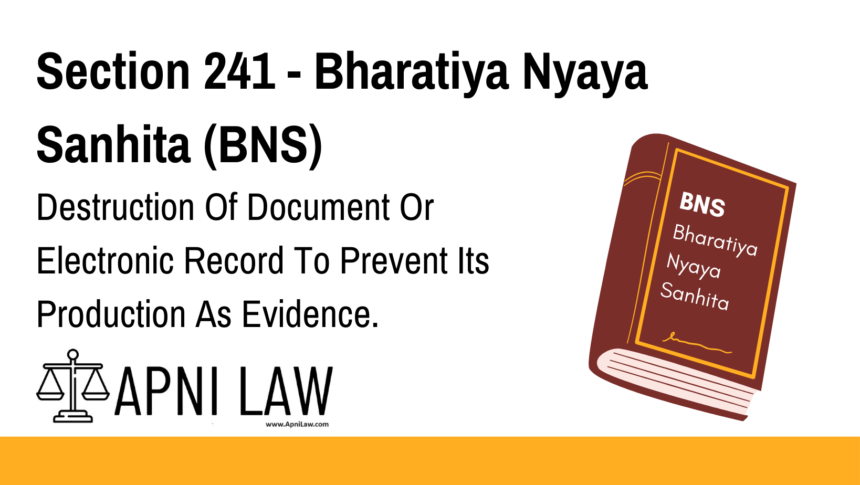Code: Section 241 BNS
Whoever secretes or destroys any document or electronic record which he
may be lawfully compelled to produce as evidence in a Court or in any proceeding
lawfully held before a public servant, as such, or obliterates or renders illegible the whole
or any part of such document or electronic record with the intention of preventing the
same from being produced or used as evidence before such Court or public servant as
aforesaid, or after he shall have been lawfully summoned or required to produce the same
for that purpose, shall be punished with imprisonment of either description for a term
which may extend to three years, or with fine which may extend to five thousand rupees,
or with both.
Explanation of Section 241 BNS
Section 241 of the Bharatiya Nyaya Sanhita (BNS), 2023, penalizes individuals who intentionally destroy, alter, or tamper with documents or electronic records to prevent them from being used as evidence in legal proceedings.
Key Elements of Section 241 BNS
- Intentional Destruction or Tampering – The accused must have knowingly destroyed or altered the document or electronic record.
- Purpose of Prevention – The act must have been committed to prevent the document from being produced as evidence.
- Covers Both Physical & Digital Evidence – Includes paper documents, emails, video recordings, chat messages, etc.
- Punishment –
- Up to 2 years imprisonment, or
- Fine, or
- Both.
- Applies Even Before a Case is Filed – The section applies even if no formal legal proceedings have started yet.
Illustration
Example 1: Deleting CCTV Footage
A shopkeeper deletes CCTV footage of a theft to prevent police from using it as evidence. This act is punishable under Section 241 BNS.
Example 2: Destroying Financial Records
An accountant shreds financial records to hide evidence of fraud before an audit. Since these records could serve as legal evidence, this falls under Section 241 BNS.
Common Questions and Answers on Section 241 BNS
1. What is the main purpose of Section 241 BNS?
- To prevent people from destroying, altering, or falsifying documents or electronic records that could be used as evidence in legal proceedings.
2. Does this section apply only to court cases?
- No. It applies to any document or record that could potentially be used as evidence, even if no case has been filed yet.
3. What are the punishments under Section 241 BNS?
- The guilty person may face:
- Up to two years imprisonment.
- A fine.
- Both imprisonment and fine.
4. How does this section relate to digital evidence?
- This law applies to electronic records such as emails, chat logs, encrypted files, and CCTV footage. Deleting, modifying, or corrupting such records to avoid legal consequences falls under Section 241 BNS.
5. Can accidental deletion be punished under this section?
- No. The section applies only when there is an intentional act of destroying or altering records to obstruct justice.
Conclusion
Section 241 BNS ensures that critical evidence is not destroyed or tampered with to obstruct justice. With the increasing use of electronic records in legal cases, this law plays a crucial role in preventing evidence manipulation.
For expert legal advice, visit ApniLaw today! 🚀








